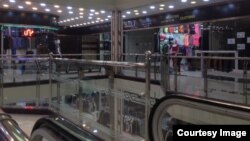Iranian Kurdish shopkeepers in northwestern Iran are threatening to resume a general strike within weeks if the government does not re-open border footpaths they use to import goods from Iraq.
In an interview with VOA Persian on Friday, a spokeswoman for shopkeepers in the city of Baneh said the government must open the footpaths by the end of Ramadan in mid-June or the strike will resume.
Shopkeepers shut almost all of Baneh’s thousands of stores for 25 consecutive days starting April 15 to try to pressure Tehran to remove a blockade that it imposed on the border footpaths last December.
Iranian Kurdish porters, known locally as kolbars, have used the footpaths for years to carry goods from Iraqi Kurdistan into Iran for sale in Baneh’s shops. The absence of such trade has further weakened the economy of Iran’s Kurdistan province, where the lack of manufacturing has impoverished many people.
Baneh residents told VOA Persian that the shopkeepers suspended their 25-day strike May 9 in a goodwill gesture toward visiting Tehran officials who met with representatives of the shopkeepers.
The residents said the visiting Iranian officials promised them good news on the border footpaths. But they said the officials made no specific promises and insisted on the strike ending before taking any action to address their demands. The residents quoted the government officials as saying that accepting the demands of people on strike would set a bad example by encouraging people elsewhere to stage similar strikes.
Baneh activists who spoke to VOA Persian said many shopkeepers were skeptical of repeated and unkept promises by government officials to end the blockade of the border footpaths. But, they said striking store owners were struggling to survive and needed to reopen to try to make some money. The activists said the shopkeepers would use new income to help sustain another strike if one is called.
Photos of a Baneh shopping mall taken on Friday and shared with VOA Persian showed stores open but virtually no customers. Many Iranian shoppers who traditionally have traveled to Baneh from as far away as Tehran have stayed away because of the border blockade, which has left Baneh’s stores bereft of desirable products imported from Iraq.
Baneh’s deputy governor Nejad Shahidi said last month that the government blocked the footpaths at Iraq’s request to “bring order to border trade and preserve security in border areas.” Many residents have rejected that explanation because of what they see as Tehran’s deep influence over Iraqi affairs.
Michael Lipin contributed to this VOA’s Persian Service report from Washington.





